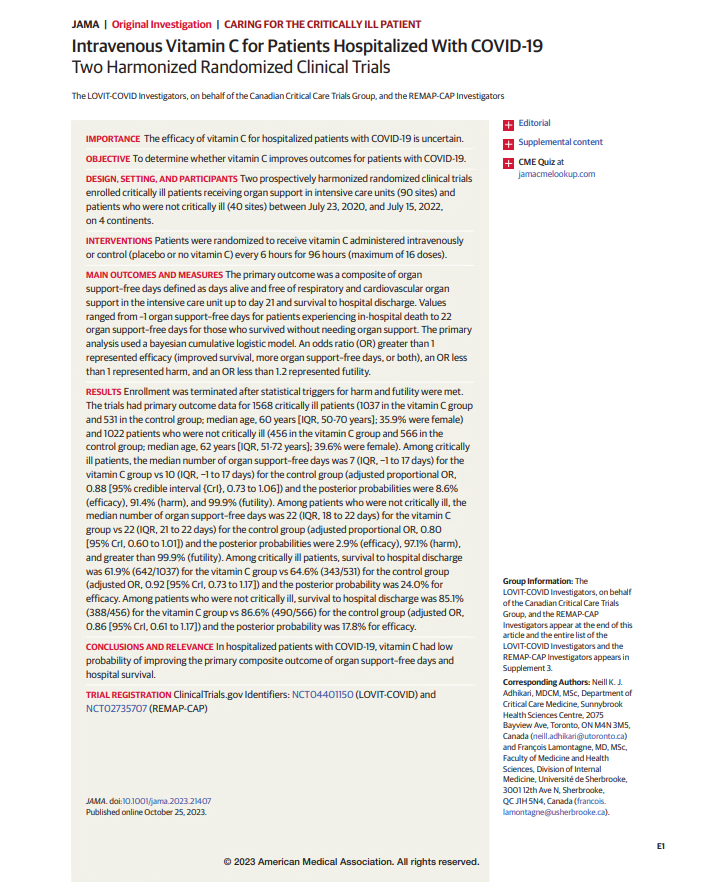Importance
The efficacy of vitamin C for hospitalized patients with COVID-19 is uncertain.
Objective
To determine whether vitamin C improves outcomes for patients with COVID-19.
Design, Setting, and Participants
Two prospectively harmonized randomized clinical trials enrolled critically ill patients receiving organ support in intensive care units (90 sites) and patients who were not critically ill (40 sites) between July 23, 2020, and July 15, 2022, on 4 continents.
Interventions
Patients were randomized to receive vitamin C administered intravenously or control (placebo or no vitamin C) every 6 hours for 96 hours (maximum of 16 doses).
Main Outcomes and Measures
The primary outcome was a composite of organ support–free days defined as days alive and free of respiratory and cardiovascular organ support in the intensive care unit up to day 21 and survival to hospital discharge. Values ranged from –1 organ support–free days for patients experiencing in-hospital death to 22 organ support–free days for those who survived without needing organ support. The primary analysis used a bayesian cumulative logistic model. An odds ratio (OR) greater than 1 represented efficacy (improved survival, more organ support–free days, or both), an OR less than 1 represented harm, and an OR less than 1.2 represented futility.
Results
Enrollment was terminated after statistical triggers for harm and futility were met. The trials had primary outcome data for 1568 critically ill patients (1037 in the vitamin C group and 531 in the control group; median age, 60 years [IQR, 50-70 years]; 35.9% were female) and 1022 patients who were not critically ill (456 in the vitamin C group and 566 in the control group; median age, 62 years [IQR, 51-72 years]; 39.6% were female). Among critically ill patients, the median number of organ support–free days was 7 (IQR, −1 to 17 days) for the vitamin C group vs 10 (IQR, −1 to 17 days) for the control group (adjusted proportional OR, 0.88 [95% credible interval {CrI}, 0.73 to 1.06]) and the posterior probabilities were 8.6% (efficacy), 91.4% (harm), and 99.9% (futility). Among patients who were not critically ill, the median number of organ support–free days was 22 (IQR, 18 to 22 days) for the vitamin C group vs 22 (IQR, 21 to 22 days) for the control group (adjusted proportional OR, 0.80 [95% CrI, 0.60 to 1.01]) and the posterior probabilities were 2.9% (efficacy), 97.1% (harm), and greater than 99.9% (futility). Among critically ill patients, survival to hospital discharge was 61.9% (642/1037) for the vitamin C group vs 64.6% (343/531) for the control group (adjusted OR, 0.92 [95% CrI, 0.73 to 1.17]) and the posterior probability was 24.0% for efficacy. Among patients who were not critically ill, survival to hospital discharge was 85.1% (388/456) for the vitamin C group vs 86.6% (490/566) for the control group (adjusted OR, 0.86 [95% CrI, 0.61 to 1.17]) and the posterior probability was 17.8% for efficacy.
Conclusions and Relevance
In hospitalized patients with COVID-19, vitamin C had low probability of improving the primary composite outcome of organ support–free days and hospital survival.



